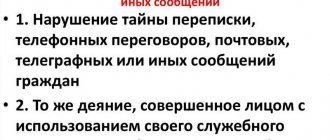1. Production of prohibited types of hazardous waste, transportation, storage, burial, use or other handling of radioactive, bacteriological, chemical substances and waste in violation of established rules, if these acts created a threat of causing significant harm to human health or the environment, -
shall be punishable by a fine in the amount of up to two hundred thousand rubles, or in the amount of the wages or other income of the convicted person for a period of up to eighteen months, or by restriction of liberty for a term of up to two years, or by forced labor for a term of up to two years, or by imprisonment for the same term.
2. The same acts that resulted in pollution, poisoning or contamination of the environment, harm to human health or mass death of animals, as well as those committed in an environmental disaster zone or in an environmental emergency zone, -
shall be punishable by a fine in the amount of one hundred thousand to three hundred thousand rubles, or in the amount of the wages or other income of the convicted person for a period of one to two years, or by forced labor for a term of up to five years, or by imprisonment for the same term.
3. Acts provided for in parts one or two of this article, which through negligence resulted in the death of a person or mass disease of people, -
shall be punishable by imprisonment for a term of up to eight years.
Commentary to Art. 247 of the Criminal Code of the Russian Federation
1. The main direct object of the crime is relations to protect the environment and ensure the environmental safety of the population. An additional object is relations to protect human life and health.
2. The subject of the crime is the environment in the totality of its constituent natural components: land, subsoil, water, atmosphere, etc. (see commentary to Article 246).
3. The objective side of the crime consists of actions to produce prohibited types of hazardous waste or handle hazardous substances (radioactive, bacteriological, chemical) and waste in violation of established rules, if they created a threat of causing significant harm to human health or the environment.
Hazardous waste is waste containing substances harmful to human health and the environment, toxic, fire hazardous, highly radioactive, explosive or containing infectious disease agents.
In accordance with Art. 4.1 of the Federal Law of June 24, 1998 N 89-FZ “On Production and Consumption Waste”, hazardous waste, depending on the degree of its harmful impact on the environment, is divided into hazard classes based on the criteria established by the federal executive body that carries out state regulation of environmental protection . Five hazard classes have been established: extremely hazardous, highly hazardous, moderately hazardous, low hazardous, and practically non-hazardous waste.
The legal basis for waste management is determined by the Federal Law “On Production and Consumption Waste”. The handling of radioactive substances and waste is regulated by the Law on the Use of Atomic Energy, Federal Law dated July 11, 2011 N 190-FZ “On the management of radioactive waste and on amendments to certain legislative acts of the Russian Federation” and a number of decrees of the Government of the Russian Federation. ——————————— See, for example: Post. Government of the Russian Federation dated October 3, 2015 N 1062 “On licensing activities for the collection, transportation, processing, disposal, disposal, disposal of waste of I-IV hazard classes” (together with the Regulations on licensing activities for collection, transportation, processing, disposal, neutralization, disposal waste of I - IV hazard classes); dated 10.09.2012 N 899 “On approval of the Regulations on the transfer of radioactive waste for disposal, including radioactive waste generated during activities related to the development, manufacture, testing, operation and disposal of nuclear weapons and nuclear power plants for military purposes.”
The procedure for the generation and handling of toxic industrial waste is also carried out on the basis of various GOSTs, technical regulations, rules, classifiers, guidelines, and instructions.
The handling of environmentally hazardous substances and waste involves the production, transportation, storage, burial, use, transfer, sale and other transactions, cleaning, collection, disposal, disposal, destruction, destruction of radioactive, chemical or bacteriological substances and waste. Since the disposition of the norm is blanket, in each case it is necessary to establish which rules were violated and refer to them when qualifying the crime.
The production of prohibited types of hazardous waste is the creation of waste that should not remain in the process of manufacturing chemical, radioactive or biological products, as well as its non-destruction or neutralization, leading to accumulation.
Transportation is the movement of specified substances and waste from one place to another (in our opinion, both by any type of transport and by carrying it by a person).
Storage is their keeping in some place (warehouse, repository, etc.) for the purpose of saving and subsequently performing any actions with them.
Burial - burying in the ground, placing in water bodies, placing in a burial ground. Article 1 of the Federal Law “On Industrial and Consumption Waste” defines the legal disposal of waste as the isolation of waste in special storage facilities in order to prevent the release of harmful substances into the environment.
The use of radioactive, chemical and bacteriological substances and waste involves their use (exploitation of their properties) by any enterprises, organizations, institutions, regardless of their form of ownership and subordination, as well as by individual citizens.
Other handling means any other actions in relation to environmentally hazardous substances and waste (transfer, sale, throwing away, burning, other destruction, etc.).
Creating a threat of causing significant harm to human health or the environment (Part 1 of the commented article) means the occurrence of a situation that would entail the harmful consequences specified in the law if they were not prevented by timely measures taken or other circumstances independent of the will of the person, violating the rules for handling environmentally hazardous substances and waste. In our opinion, the threat mentioned above is also the threat of the spread of the epidemic. This conclusion follows from a comparative analysis of the norm in question and other norms on liability for environmental crimes, where harm to human health is indicated as consequences.
Significant harm to human health in relation to Part 1 of the commented article is expressed in severe or moderate harm to the health of at least one person, and significant harm to the environment - in its pollution, poisoning or contamination, a change in the radioactive background to values posing a danger to health or life person, etc. (Clause 6 of the Post. Plenum of the Armed Forces of the Russian Federation dated October 18, 2012 N 21).
4. The crime is considered completed from the moment of committing the actions listed in Part 1 of the commented article, if they created a real threat of causing significant harm to human health or the environment (the so-called composition of the threat as a type of formal).
5. From the subjective side, the crime is characterized by direct intent. Motives and goals may be different and do not influence the qualification of the crime.
6. The subject of the crime is a sane individual who has reached the age of 16.
7. A qualifying feature in accordance with Part 2 of the commented article is the commission of acts specified in Part 1 of the commented article, which entailed:
- environmental pollution, i.e. physical, chemical, radiation, aromatic, biological change in the quality of water, air, soil, exceeding established standards for harmful effects on the environment and creating a threat to human health, the state of flora and fauna, the gene pool of animals, plants and humans, the ozone layer;
- environmental poisoning - a type of pollution, saturation of components (resources) of the natural environment with toxic substances and waste that can cause death or impairment of health of people and animals, destruction or inhibition of vegetation growth, mutations;
- contamination of the environment - introduction into the habitat of pathogens of diseases of animals, plants and humans, as well as plant pests capable of rapid reproduction (both plant and animal origin);
— causing harm to human health (see commentary to Article 246);
— mass death of animals, i.e. death of animals, birds, aquatic animals, including fish, in a certain territory, in which their mortality rate exceeds the average statistical level by three or more times (clause 5 of the Post. Plenum of the Armed Forces of the Russian Federation dated October 18, 2012 N 21).
Ecological disaster zones and their legal regime are established in accordance with Art. 57 of the Law on Environmental Protection legislation on these zones.
Clause 2 of Art. 57 of the Law on Environmental Protection provides that environmental protection in emergency zones is established by Federal Law dated December 21, 1994 N 68-FZ “On the protection of the population and territories from natural and man-made emergencies”, other federal laws and other regulatory legal acts of the Russian Federation, laws and other regulatory legal acts of the constituent entities of the Russian Federation.
8. The crimes provided for in Part 2 of the commented article (except for those committed in zones of environmental disaster or environmental emergency) have a material composition and are considered completed from the moment the specified consequences occur. The acts specified in Part 1 of the commented article, committed in zones of environmental disaster or environmental emergency, are completed from the moment of their commission, regardless of the occurrence of consequences (formal composition).
9. From the subjective side, the crime provided for in Part 2 of the commented article is characterized by both intentional and careless forms of guilt (clause 4 of the Post. Plenum of the Armed Forces of the Russian Federation dated October 18, 2012 N 21).
10. Particularly qualifying features of Part 3 of the commented article include acts provided for in Part 1 or 2 of this article, which through negligence resulted in the death of a person or a mass disease of people.
A mass disease should be considered a disease of many people that exceeds the usually recorded level, including the occurrence of an epidemic (see commentary to Article 248).
11. The subjective side of the crimes provided for in Part 3 of the commented article is characterized by a careless attitude towards the death of a person or mass disease of people. However, the acts themselves can be, as noted above, either intentional or careless. In the case of their intentional commission, the act acquires the characteristics of a crime with two forms of guilt (Article 27 of the Criminal Code of the Russian Federation) and is generally considered to be committed intentionally, and in the case of carelessness, in general the entire crime is considered careless.
12. Criminal violation of the rules for handling environmentally hazardous substances and waste competes with Art. Art. 8.2 and 8.3 of the Administrative Code.
The commented article is subject to application only if a violation of the rules of production, transportation, storage, application specified in Art. Art. 8.2, 8.3 of the Code of Administrative Offenses of chemicals or waste created a real threat of causing significant harm to human health or the environment (Part 1 of the commented article), including atmospheric air and wildlife, or resulted in pollution, poisoning, contamination of the environment, harm to human health, mass death of animals, or although it did not entail the indicated consequences, it was committed in an area of environmental disaster or in an area of environmental emergency (Part 2 of the commented article). Thus, the basis for the distinction between a crime and a misdemeanor is based on such elements of composition as the act, the consequences (their nature and severity) and the place where the act was committed. If the act did not entail any consequences or only created an abstract possibility of causing harm to the environment, we should be talking about an administrative offense (according to Article 8.2 or 8.3 of the Code of Administrative Offenses). Articles 8.2 and 8.3 of the Code of Administrative Offenses, unlike the article under comment, do not provide for liability for the production of hazardous substances and waste.
The article under comment regarding the disposal of radioactive, bacteriological or chemical substances and waste in violation of established rules is similar to Art. 8.19 and part 5 of Art. 8.13 Code of Administrative Offenses regarding the disposal of harmful substances in water bodies.
The crime provided for in Part 1 of the commented article is completed from the moment a real threat of causing significant harm to human health or the environment is created. To qualify an act under Part 2 of this article, the occurrence of criminal consequences or burial in a zone of environmental disaster or environmental emergency is required, and to qualify under Part 3 of this article - the death of a person or a mass disease of people.
Offenses provided for in Art. 8.19 and part 5 of Art. 8.13 of the Code of Administrative Offences, are terminated from the moment the actions (inaction) provided for therein are completed. Consequences are not a mandatory feature of the offense.
The distinction between a crime and a misdemeanor should also be made based on the types of waste and substances disposed of. The crime involves the burial of hazardous waste, radioactive, bacteriological, chemical substances and waste prohibited from production, i.e. substances that pose an increased risk.
In Art. 8.19 and part 5 of Art. 8.13 of the Code of Administrative Offenses refers to other waste and materials. Their burial in water bodies and on the shelf is, in principle, permitted, but in compliance with established rules and in a special order.
Judicial practice under Article 247 of the Criminal Code of the Russian Federation
Appeal ruling of the Judicial Collegium for Criminal Cases of the Supreme Court of the Russian Federation dated December 6, 2018 N 4-APU18-42 On
July 25, 2021, the Deputy Prosecutor General of the Russian Federation issued a resolution to satisfy the request of the General Prosecutor's Office of the Republic of Tajikistan to extradite Tursinaliev Abdurasul, ... to the Republic of Tajikistan for prosecution criminal liability for fraud on an especially large scale under paragraph “b” of Part 4 of Art. 247 of the Criminal Code of the Republic of Tajikistan and forgery of an official document under Part 1 of Art. 340 of the Criminal Code of the Republic of Tajikistan.
Appeal ruling of the Judicial Collegium for Criminal Cases of the Supreme Court of the Russian Federation dated November 21, 2018 N 53-APU18-13
law enforcement agencies of the Republic of Tajikistan to bring to criminal liability for fraud under paragraph “b” of Part 4 of Art. 247 of the Criminal Code of the Republic of Tajikistan. Having heard the report of judge Vedernikova O.N., the speeches of Nurov S.S. and defense attorney P.S. Tedeev, who supported the arguments of the complaint, the opinion of the prosecutor of the General Prosecutor's Office of the Russian Federation A.A. Modestova. on leaving the decision unchanged, Judicial Collegium
Appeal ruling of the Judicial Collegium for Criminal Cases of the Supreme Court of the Russian Federation dated October 15, 2019 No. 5-APU19-75
in the Republic of Tajikistan, Khodzhiev is accused of committing a crime under paragraph “a” of Part 3 of Art. 247 of the Criminal Code of the Republic of Tajikistan. By the resolution of the Deputy Prosecutor General of the Russian Federation G.B. Lopatin dated June 10, 2021, the request of the Prosecutor General’s Office of the Republic of Tajikistan for the extradition of F.Kh. Khodzhiev was satisfied. law enforcement agencies of the Republic of Tajikistan to bring to criminal liability for large-scale fraud.
Appeal ruling of the Judicial Collegium for Criminal Cases of the Supreme Court of the Russian Federation dated September 10, 2019 N 5-APU19-66
by a resolution of the Moscow City Court dated July 2, 2021, the complaint of M.G. Yulchiev was left unsatisfied. to the resolution of the Deputy Prosecutor General of the Russian Federation dated May 29, 2019 on his extradition to law enforcement agencies of the Republic of Tajikistan for criminal prosecution under paragraph “b” of Part 4 of Art. 247 (two crimes) and paragraph “b” of Part 2 of Art. 340 (2 crimes) of the Criminal Code of the Republic of Tajikistan, the rest of the request was refused.
Appeal ruling of the Judicial Collegium for Criminal Cases of the Supreme Court of the Russian Federation dated November 13, 2018 N 5-APU18-77
competent authorities of the Republic of Tajikistan for criminal prosecution under clause “b”, part 4 of art. 247 of the Criminal Code of the Republic of Tajikistan, and the complaint of T.N. Khuzhaev The prosecutor's decision was left unsatisfied. In his appeal, Khuzhaev does not agree with the decision of the Deputy Prosecutor General of the Russian Federation to extradite him, believes that the extradition check was carried out superficially, points to his innocence in committing a crime and the inconsistency in the decisions on bringing him as an accused, on his arrest and the prosecutor’s request for extradition to indicating the amount of damage caused.
Appeal ruling of the Judicial Collegium for Criminal Cases of the Supreme Court of the Russian Federation dated February 27, 2019 N 18-APU19-3
law enforcement agencies of the Republic of Tajikistan to bring to criminal liability for fraud under paragraph “b” of Part 4 of Art. 247 of the Criminal Code of the Republic of Tajikistan. Having heard the report of the judge of the Supreme Court of the Russian Federation O.N. Vedernikova, who outlined the content of the decision and the essence of the appeal, the speech of the defense lawyer V.S. Burmistrov, who supported the arguments of the complaint, the objection of the prosecutor of the General Prosecutor's Office of the Russian Federation L.A. Kurochkina, who believed that the decision should be left unchanged , Judicial Collegium
Cassation ruling of the Judicial Collegium for Criminal Cases of the Supreme Court of the Russian Federation dated May 25, 2021 N 78-UD21-12-K3
If the circumstances specified in Part 5 of Art. 247 of the Criminal Code of the Russian Federation, a sentence or ruling passed in absentia, at the request of the convicted person or his defense attorney, is canceled in the manner prescribed by Chapter 48 of the Criminal Procedure Code of the Russian Federation. In such a case, the trial is carried out as usual.
Determination of the Constitutional Court of the Russian Federation dated 07/08/2021 N 1373-O
The criminal law establishes a system of special norms aimed at ensuring safety in certain areas of life, characterized by increased requirements for the behavior of subjects (in particular, articles 143, 215, 216, 217, 218, 219, 236, 247, 263, 264, 268, 350 of the Criminal Code of the Russian Federation). In such relations, their participants act as special subjects called upon to comply with a set of rules that ensure both individual safety and the general security of life and health of a wide (indefinite) circle of people. Failure to comply (violate) the requirements of special norms in itself creates a danger of causing harm to the life and health of people and other objects of criminal legal protection.
Resolution of the Plenum of the Supreme Court of the Russian Federation dated October 31, 2017 N 41
"6. When deciding whether a person’s actions contain signs of a crime under Article 247 of the Criminal Code of the Russian Federation, courts should proceed from the provisions of both Federal Law No. 89-FZ of June 24, 1998 “On Production and Consumption Waste” and other federal laws ( for example, Federal Laws of November 21, 1995 N 170-FZ “On the Use of Atomic Energy”, dated July 11, 2011 N 190-FZ “On the Management of Radioactive Waste and on Amendments to Certain Legislative Acts of the Russian Federation”).
Judicial practice: sentences and punishment under Art. 247 of the Criminal Code of the Russian Federation
- Resolution of the Plenum of the Supreme Court of the Russian Federation dated... PLENARY OF THE SUPREME COURT OF THE RUSSIAN FEDERATION DECISION dated December 27, 2002 N 29 ON JUDICIAL PRACTICE IN CASES OF THEFT,...
- Decision of the Supreme Court: Determination N 203-APU17-21... THE SUPREME COURT OF THE RUSSIAN FEDERATION Case No. 203-APU17-21 APPEAL DECISION Moscow August 31, 2021 Judicial Collegium for Military Personnel of the Supreme...
- Decision of the Supreme Court: Resolution No. 310P13 dated... DECISION OF THE PRESIDIUM OF THE SUPREME COURT OF THE RUSSIAN FEDERATION Case No. 310-P13 Moscow January 23, 2014 Presidium of the Supreme Court of the Russian Federation...
- Resolution of the Plenum of the Supreme Court of the Russian Federation dated... PLENARY OF THE SUPREME COURT OF THE RUSSIAN FEDERATION DECISION of November 15, 2021 N 48 ON THE PRACTICE OF APPLICATION BY COURTS OF LEGISLATION GOVERNING FEATURES...
- Resolution of the Plenum of the Supreme Court of the Russian Federation dated... PLENAUM OF THE SUPREME COURT OF THE RUSSIAN FEDERATION DECISION dated June 25, 2021 N 18 ON JUDICIAL PRACTICE IN CASES OF CRIMES,...
- Ruling of the ECtHR dated 02/14/2017 EUROPEAN COURT OF HUMAN RIGHTS THIRD SECTION CASE “MASLOVA VS. RUSSIAN FEDERATION” (Complaint No. 15980/12) JUDGMENT…
- Judicial Collegium for Criminal Cases, appeal:... THE SUPREME COURT OF THE RUSSIAN FEDERATION Case No. 72-APU 17-21 APPEAL DECISION Moscow October 04, 2021 Judicial Collegium for Criminal Cases...
- Resolution of the Presidium of the Supreme Court of the Russian Federation dated... PRESIDIUM OF THE SUPREME COURT OF THE RUSSIAN FEDERATION DECISION dated December 5, 2018 N 126-P18 ON RESUMING PROCEEDINGS IN THE CASE DUE TO NEW...
- Resolution of the Plenum of the Supreme Court of the Russian Federation dated... PLENAUM OF THE SUPREME COURT OF THE RUSSIAN FEDERATION DECISION dated December 17, 2021 N 43 ON SOME ISSUES OF JUDICIAL PRACTICE IN CASES...
- Decision of the Supreme Court: Determination No. 38-АПУ17-2 dated... THE SUPREME COURT OF THE RUSSIAN FEDERATION No. 38-АПУ17-2 APPEAL DECISION Moscow March 1, 2021 Judicial Collegium for Criminal Cases of the Supreme Court...




